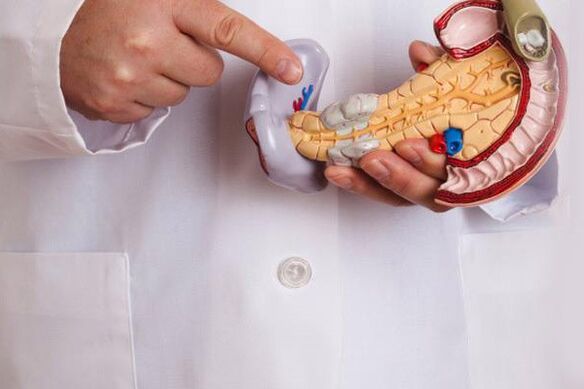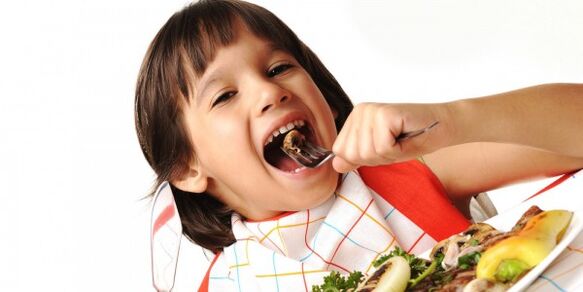Diet for pancreatitis is a key factor in successful treatment, so sticking to dietary restrictions will help you lead a fulfilling life and reduce your chances of recurrence.
Pancreatitis is inflammation of the tissue of the pancreas, accompanied by impaired secretion of digestive enzymes, severe pain, stool changes, and vomiting. This leads to a pathological metabolic disorder and can trigger the development of diabetes mellitus. The main factors that trigger pancreatitis are: overeating, overuse of fatty foods and alcohol.
It is necessary to follow a diet for pancreatitis for a long time. Acute inflammation requires dietary restriction for 6-9 months, while in chronic pancreatitis, the diet is followed for several years or for life.
Power feature

Approaches to prescribing a diet for pancreatitis depend on whether the inflammation is in an acute or chronic form. Doctors note a positive effect of the diet on pancreatitis. It allows you to quickly overcome acute inflammation, avoid complications, prolong remission of the disease in the chronic process.
Features of the diet:
- Within 2-3 days after an episode of acute pancreatitis, you must completely refuse food. Therefore, the rest is supplied to the pancreas. Therapeutic fasting involves the use of liquids in the form of non-carbonated alkaline mineral water, diluted tea or rosehip oil infusion, one glass 5-6 times a day.
- On the fourth day after the initiation of therapeutic fasting, gradually introduce solid foods into the diet. As a rule, these are low-calorie, salt-free meals that will gradually increase the secretion of gastric juices.
- With pancreatitis, the way you prepare your food matters a lot. Steam cooking is recommended because food prepared in this way retains all the necessary substances and does not harm the digestive tract.
- Food should not be cold or hot, the optimal temperature is close to body temperature. In this case, the food should be finely ground or semi-liquid.
- Diet for pancreatitis restricts the consumption of even diet foods. They eat small portions at least five times a day.
The diet excludes the following foods:

- fat;
- fried;
- hot sauces and condiments;
- sour juices;
- canned food, pickles;
- Bacon;
- candy;
- cocoa, chocolate;
- alcohol.
The energy value of such food should be at 2500 kcal.
The disadvantage of such a diet is the severe deficiency of raw plant foods. Some ingredients need to be offset by taking multivitamins and supplements.
Diet for acute pancreatitis
Diet in the treatment of pancreatitis is an integral part of therapy. During the exacerbation, the attack is accompanied by severe abdominal pain and loss of appetite, so the first few days of fasting are not painful for the patient.
Moreover, low-calorie diet foods are gradually introduced into the diet. It can be uncooked dry bread, berry drinks and jellies, oatmeal and rice decoction, liquid mashed potatoes without oil. At this point, products that contribute to gas generation should be excluded.
On days 6-7, foods that provide protein are gradually introduced: steamed meat, mashed potatoes or pudding from vegetables, steamed protein omelette.
It should be noted that the diet requires long-term adherence to dietary restrictions. For 6-9 months, you need to strictly follow its rules and monitor the diet daily.
The course of the disease can have certain features, therefore, a gastroenterologist and nutritionist will be involved in the appointment of a diet. The specialists of this profile determine what can be eaten in the pancreatitis diet for each specific patient, taking into account comorbidities.
After the acute phase of the disease has subsided, you can significantly diversify your menu with simple and healthy products. It should be borne in mind that the number of meals should be at least four, while the volume of drunken liquids is about 1. 5 liters per day.
Sample menu:
- Breakfast: congee with rice flour (rice) cooked in water; Apple; Dilute green tea with a teaspoon of honey.
- Second breakfast: steamed chicken breast; pureed carrots; decoction of rose hips.
- Lunch: vegetable broth with beef or fish; mashed potato; crouton white bread; Baked apples without the skin.
- Afternoon snack: low-fat cheese; Green tea with a teaspoon of honey.
- Dinner>: protein steamed omelette from three chicken eggs; mashed potatoes from diet vegetables; crouton white bread.
- Before going to bed: curd.
With a diet, the symptoms and treatment of pancreatitis are markedly relieved. Such nutrition helps the pancreas and gradually normalizes its work. The health of the patient will depend on how strictly he follows the diet. Any disturbance in the diet is immediately reflected in digestive function.
Diet for chronic pancreatitis
Chronic pancreatitis often develops against the background of an acute condition, but it can also occur as a primary disease in cases where it is a complication of other conditions.
Diet and treatment for pancreatitis are two inseparable concepts. Even when the disease is in remission, dietary guidelines should be followed.
Dietary rules for chronic pancreatitis:
- The calorie content of food during this period should be commensurate with daily physical activity.
- Much attention is paid to the protein content of foods. Turkey, chicken, rabbit, beef, lean pork and fish are allowed.
- Lamb, fatty pork, geese, duck and game dishes are not allowed in the diet.
- Heat treatment of food not for frying, baking in the oven, stewing. Food must be cooked in a double boiler or boiled.
- Cheese, formerly banned in the aggravation stage, is now allowed in small quantities, but milk should be replaced with fermented milk products.
- The diet should include vegetable proteins, represented by yesterday's cereals and breads, while it is necessary to completely exclude legumes from the diet with pancreatitis.
- Total carbohydrate intake should not exceed 350 g per day. They are found in pasta, cereals, honey, preservatives and syrups.
Approximate dietary menu for chronic pancreatitis:
- Breakfast: boiled rabbit meat; rice cabinet.
- Brunch: low-fat cheese; Baked apples without honey.
- Lunch: buckwheat soup; boiled or steamed fish with vegetables; compote dried fruit.
- Afternoon snack: steamed cutlet with vegetable sauce.
- Dinner: veal, unsweetened curd pudding; pale tea.
- Before going to bed: kefir.
Meals are divided into small portions. Food should be served warm about three hours apart.
Salt and spices increase the secretion of enzymes in the digestive tract, so their intake should be kept to a minimum. In addition, sour foods, smoked foods, baked goods and sour cream, as well as chocolate, also have the same effect. Sugary foods can cause complications such as diabetes, so their content in the diet is reduced by 90%.














































































